The Tata Motors business model is based on providing innovative automobiles for people worldwide on the following key pillars; innovation and technology, global footprints, a diversified product portfolio, and a strong brand reputation. It invests heavily in research and development (R&D) to develop new and innovative products and technologies, helping it stay ahead of the competition and launch world-class vehicles that meet customers’ needs.
Additionally, the company has a strong presence in India and other key markets worldwide. This allows the company to reach a broader customer base and grow its business. It offers many vehicles, including passenger cars, commercial vehicles, and buses, helping the company meet the needs of a diverse customer base.
Tata Motors has a strong brand reputation in India and other markets due to the company’s commitment to quality, safety, and innovation. The company’s strong financial performance is due to several factors, including its focus on innovation, its global footprint, and its diversified product portfolio. Tata Motors is well-positioned to continue to grow in the years to come.
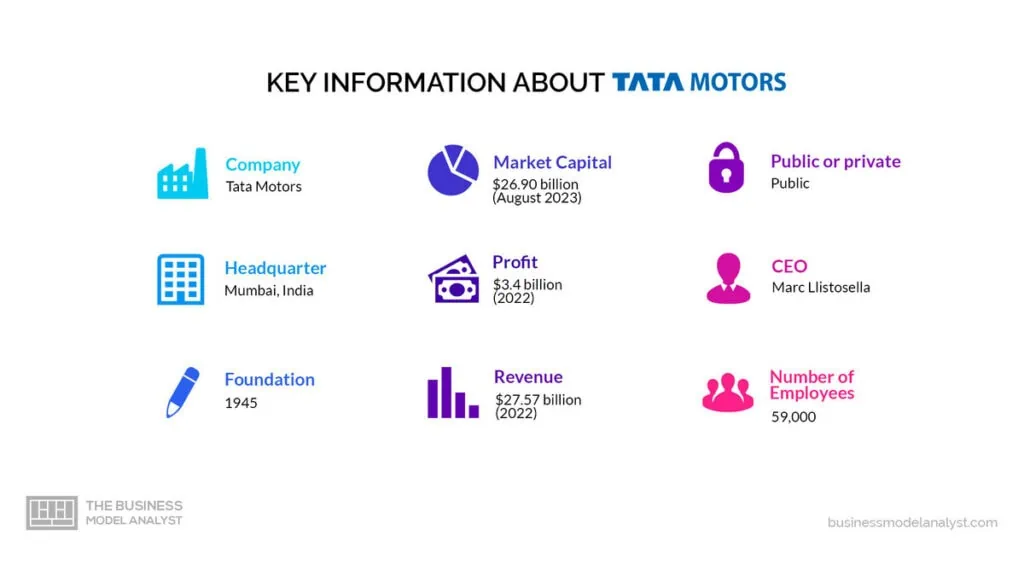
Contents
A brief history of Tata Motors
Tata Motors is an Indian multinational automotive manufacturing company headquartered in Mumbai, Maharashtra. It is the largest automobile manufacturer in India and the fourth largest in Asia. The company was founded in 1945 by Jamsetji Tata, one of the most prominent industrialists in India. Its first product was a steam locomotive, which was manufactured in 1903.
The company later diversified into producing automobiles, buses, trucks, and defense vehicles. In 1954, Tata Motors launched its first passenger car, the Tata Standard. The company has since launched many successful passenger car models, including the Indica, Indigo, and Nano.
Tata Motors has also made significant inroads into the global market. In 2008, the company acquired the British automobile manufacturer Jaguar Land Rover. This acquisition has helped Tata Motors become a major player in the global luxury car market.
In recent years, Tata Motors has been focusing on developing electric vehicles. The company has launched a number of electric cars, including the Tata Nexon EV and the Tata Tigor EV. Tata Motors is also working on developing hydrogen fuel cell vehicles.
Tata Motors is a significant employer in India, with over 50,000 employees. The company has a solid commitment to social responsibility. It is involved in several initiatives to improve the people’s lives in India. It is a leading player in the global automotive industry. The company is committed to providing innovative and sustainable mobility solutions to its customers.
Who owns Tata Motors?
Tata Motors is a publicly traded company owned by the Tata Group, a multinational conglomerate headquartered in India. Tata Sons, the holding company of Tata Group, owns a majority stake in Tata Motors. Other major shareholders of Tata Motors include the Life Insurance Corporation of India, GIC Pte. Ltd., and Rakesh Jhunjhunwala. Marc Llistosella is the current CEO of Tata Motors.
Tata Motors Mission Statement
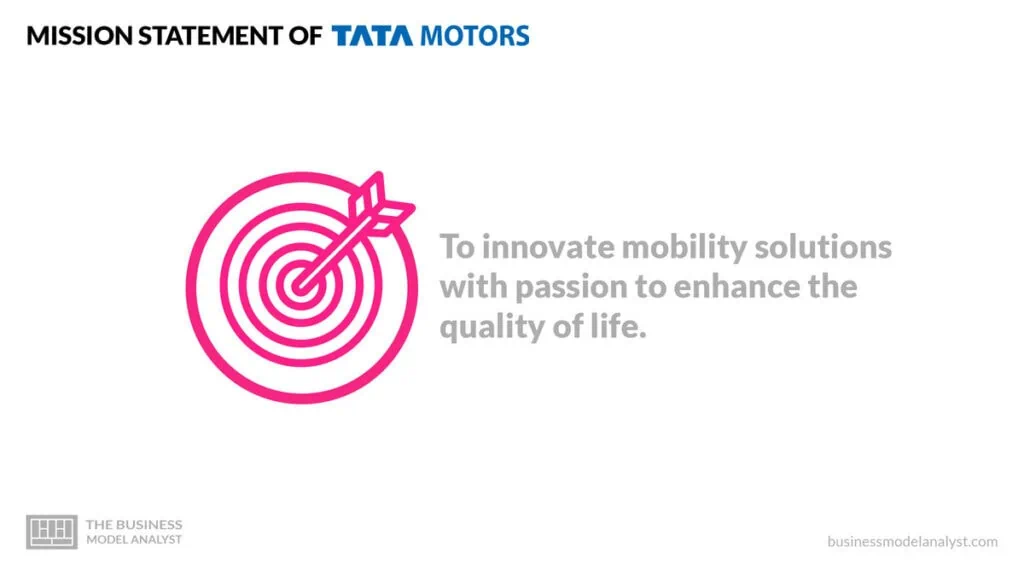
Tata Motors’ mission statement is “to innovate mobility solutions with passion to enhance the quality of life.”
How Tata Motors Works
As one of the largest automotive companies in India and the fourth largest in Asia, Tata Motors designs, develops, manufactures, and sells a wide range of vehicles, including passenger cars, trucks, buses, and defense vehicles. Here are some of the key steps involved in how Tata Motors works
First, Tata Motors invests heavily in research and development to develop new and innovative products and technologies. The company has a number of research and development centers around the world, where engineers and scientists work on developing new vehicles, engines, and other technologies.
Also, the company has several manufacturing plants worldwide, where vehicles are produced. The company uses a variety of manufacturing processes, including stamping, welding, painting, and assembly.
In addition, it has a global sales and marketing network, which is responsible for selling and distributing the company’s vehicles. The company also has many dealerships and service centers globally, where customers can go for repairs and maintenance.
Finally, it also offers a comprehensive after-sales service, that includes repairs, maintenance, and parts. The company also provides a variety of financing options to help customers purchase its vehicles.
How Tata Motors makes money
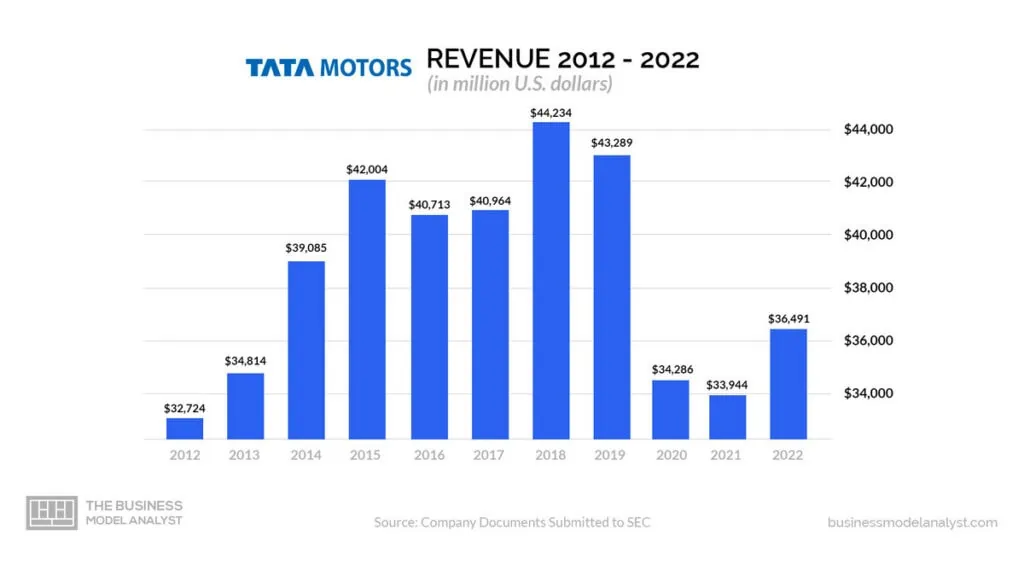
As a company constantly innovating and expanding its business, Tata Motors makes money through vehicle sales, after-sales service, licensing and royalties, financial services, and other income.
Vehicle sales
Tata Motors sells a wide range of vehicles, including passenger cars, trucks, buses, and defense vehicles. These vehicles are sold in over 170 countries worldwide, making Tata Motors one of the most globally diversified automotive companies.
After-sales services
Tata Motors offers a comprehensive after-sales service, that includes repairs, maintenance, and parts. The company also offers many financing options to help customers purchase its vehicles, making owning a Tata car easier.
Licensing and royalties
Tata Motors licenses its technology to other companies and receives royalties for using its intellectual property. This helps the company generate revenue from its products even after they have been sold.
Financial services
Tata Motors offers a variety of financial services, such as leasing and insurance, to its customers. This helps the company to provide its customers with the financing they need to purchase its vehicles and to protect them against financial risks.
Other income
Tata Motors also generates income from other sources, such as selling spare parts and accessories. This helps the company diversify its revenue streams further and reduce its reliance on any one source of income.
Tata Motors Business Model Canvas
The Tata Motors Business Model can be explained in the following business model canvas:
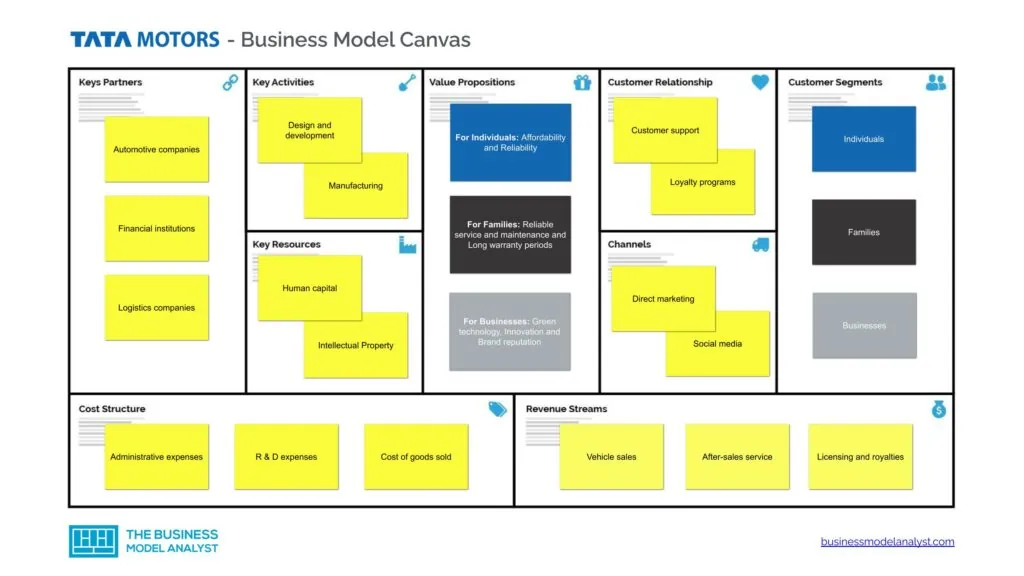
Tata Motors Customer Segments
Tata Motors’ customer segments are:
- Individuals
- Families
- Businesses
- Government agencies
- Fleet operators
- Exporters
Tata Motors Value Propositions
Tata Motors’ value propositions are:
Value Propositions for Individuals:
- Affordability: Tata Motors offers various vehicles at various price points, making it an attractive option for budget-conscious individuals. For example, the Tata Nano is one of the most affordable cars in the world, starting at just ₹2.5 lakhs (~$3,300);
- Reliability: Tata Motors vehicles are known for their reliability and durability. The company has a long history of manufacturing quality vehicles that can withstand harsh Indian conditions. This makes Tata Motors a good choice for individuals looking for a car that lasts many years.
Value Propositions for Families:
- Reliable service and maintenance: Tata Motors has a nationwide network of service centers to help families keep their vehicles in top condition;
- Long warranty periods: Tata Motors vehicles come with extended warranty periods, which gives families peace of mind knowing that they are covered in case of repairs or breakdowns.
Value Propositions for Businesses:
- Green technology: Tata Motors is committed to developing and providing green vehicles that are more environmentally friendly. This includes electric and hybrid vehicles, as well as cars that use alternative fuels. These vehicles can help businesses reduce their carbon footprint and comply with environmental regulations;
- Innovation: Tata Motors is constantly innovating and developing new technologies that can improve the performance and efficiency of its vehicles. This includes developing new engines, transmissions, and safety features. These innovations can help businesses save money on fuel and maintenance costs;
- Brand reputation: Tata Motors is a well-respected brand with a long history of quality and reliability. Businesses can be confident that Tata Motors vehicles will meet their expectations. Brand reputation can also help businesses build trust with their customers.
Value Propositions for Government agencies:
- Customization: Tata Motors can work with government agencies to customize vehicles to meet their needs. This can be a valuable benefit for agencies that have unique requirements, such as vehicles that need to be equipped with special features for law enforcement or emergency response;
- After-sales support: The company has a nationwide network of dealerships and service centers that can provide government agencies with the support they need to keep their vehicles running smoothly. This can be a valuable benefit for agencies that must keep their vehicles operational 24/7.
Value Propositions for Fleet Operators:
- Low total cost of ownership: Tata Motors vehicles are known for their low total cost of ownership. This includes the cost of purchase, fuel, maintenance, and repairs. This can be a valuable benefit for fleet operator agencies, as it can help them save money;
- Customized solutions: The brand works with fleet operator agencies to customize vehicles to meet their needs. This can include features such as special livery, security systems, and tracking devices. This can be a valuable benefit for fleet operator agencies, as it can help them improve the efficiency and security of their operations.
Value Propositions for Exporters:
- Low maintenance costs: Tata Motors vehicles are known for their low maintenance costs because they are designed to be durable and long-lasting. This can save export agencies money in the long run, as they will not have to spend as much on repairs and maintenance;
- High resale value: Tata Motors vehicles have a high resale value because they are well-respected and reliable brands. This means that export agencies can sell their cars for a reasonable price when they are no longer needed. This can help export agencies recoup some of the costs of purchasing the vehicles;
- Wide range of vehicles: Tata Motors offers a wide range of vehicles to choose from, so export agencies can find the perfect vehicle for their needs. This includes trucks, buses, vans, and cars. This can be a valuable benefit for export agencies transporting different cargo types.
Tata Motors Channels
Tata Motors’ channels are:
- Direct marketing
- Social media
- Word-of-mouth
- Salesforce
- Events
- Social media
- Public relations
- Advertising
Tata Motors Customer Relationships
Tata Motors’ customer relationships comprise:
- Customer support
- Loyalty programs
- Social media
- Events
- Direct marketing
- Salesforce CRM
Tata Motors Revenue Streams
Tata Motors’ revenue streams are:
- Vehicle sales
- After-sales service
- Licensing and royalties
- Financial services
- Other income
Tata Motors Key Resources
Tata Motors’ key resources include:
- Human capital
- Intellectual Property
- Financial resources
- Brand reputation
- Manufacturing facilities
- Distribution network
- Technology
- Partnerships
Tata Motors Key Activities
Tata Motors’ key activities include:
- Design and development
- Manufacturing
- Sales and Marketing
- After-sales service
- Research and Development
- Logistics
- Finances
- Customer service
Tata Motors Key Partners
Tata Motors’ key partners include:
- Automotive companies
- Financial institutions
- Logistics companies
- Technology companies
- After-sales service providers
Tata Motors Cost Structure
Tata Motors’ cost structure includes:
- Administrative expenses
- R & D expenses
- Cost of goods sold
- Depreciation and amortization expenses
- Interest expenses
- Other expenses
Tata Motors Competitors
Below, there are some of Tata Motors’ competitors:
- Maruti Suzuki India Limited: Maruti Suzuki is an Indian automobile manufacturer headquartered in New Delhi, India. It is a subsidiary of Suzuki Motor Corporation of Japan. It was founded in 1981 by the Government of India and Suzuki Motor Corporation. Maruti Suzuki is the largest car manufacturer in India, with a market share of over 50% in the Indian passenger car market. The company’s products include hatchbacks, sedans, SUVs, and vans. Its most popular models include the Alto, Swift, Dzire, Baleno, and Vitara Brezza. It also exports its cars to a number of countries, including South Africa, Europe, and Latin America. Its market capitalization is over ₹900 billion (US$11.5 billion). It employs over 20,000 people and has a manufacturing plant in Gurgaon, Haryana. Maruti Suzuki is a major player in the Indian automotive industry, committed to providing affordable and reliable cars to Indian customers;
- Toyota Motor Corporation: Toyota is a Japanese multinational automotive corporation headquartered in Toyota, Aichi, Japan. It was founded by Kiichiro Toyoda in 1937 as a spinoff from Toyoda Automatic Loom Works, founded by his father, Sakichi Toyoda. Toyota is the world’s largest automaker by volume, producing over 10 million vehicles annually. The company’s products include cars, trucks, buses, and hybrid and electric vehicles. Toyota’s most popular models include the Corolla, Camry, RAV4, and Prius. The company also has many luxury brands, including Lexus and Scion. Its market capitalization is over ¥2.5 trillion (US$220 billion). The company employs over 360,000 people and manufactures plants in over 20 countries. It is also a significant player in the global automotive industry, producing high-quality, reliable vehicles;
- Volkswagen Group: The Volkswagen Group is a German multinational automotive corporation headquartered in Wolfsburg, Lower Saxony, Germany. It is the world’s largest automaker by sales. The company was founded in 1937 by the German Labor Front under the leadership of Adolf Hitler as a state-owned company, but was privatized in the 1960s. Volkswagen Group’s brands include Volkswagen, Audi, SEAT, Škoda, Bentley, Bugatti, Lamborghini, Porsche, Ducati, MAN, Scania, and Navistar. The company also has several financial services subsidiaries. Volkswagen Group’s market capitalization is around €145 billion (US$156 billion). It employs over 670,000 people and has manufacturing plants in over 30 countries;
- Hyundai Motor India Limited: Hyundai Motor is an Indian automobile manufacturer headquartered in Gurugram, Haryana, India. It is a subsidiary of Hyundai Motor Company in South Korea. The company was founded in 1996 by the Government of India and Hyundai Motor Company. Hyundai Motor India is the second-largest car manufacturer in India. It has a market share of around 17% in the Indian passenger car market. Its products include hatchbacks, sedans, SUVs, and vans. Hyundai Motor India’s most popular models include the Grand i10, Creta, and Venue. The company also exports its cars to a number of countries, including Europe, Africa, and Latin America. Its market capitalization is around ₹700 billion (US$9.2 billion). The company employs over 40,000 people and has manufacturing plants in Chennai, Tamil Nadu, and Sriperumbudur, Tamil Nadu;
- Mahindra & Mahindra is an Indian multinational automotive and farm equipment corporation headquartered in Mumbai, Maharashtra, India. It was founded in 1945 by brothers Kailash Chandra Mahindra and Jagdish Chandra Mahindra, along with Malik Ghulam Muhammad. Mahindra & Mahindra is a diversified company with interests in a number of sectors, including automotive, farm equipment, information technology, and financial services. Its automotive products include SUVs, trucks, buses, and tractors. Mahindra & Mahindra’s most popular models include the Thar, Scorpio, Bolero, and XUV500. The company also exports its vehicles to a number of countries, including Europe, Africa, and Latin America. Its market capitalization is around ₹2.2 trillion (US$28 billion). The company employs over 250,000 people and has manufacturing plants in India, the United Kingdom, and Brazil.
Tata Motors SWOT Analysis
Despite its successes, Tata Motors is not without its weaknesses. Also, there are some opportunities the company can leverage to strengthen its position in the market while eliminating the threats that stand in its way. Below, there are Tata Motors’ swot analysis.
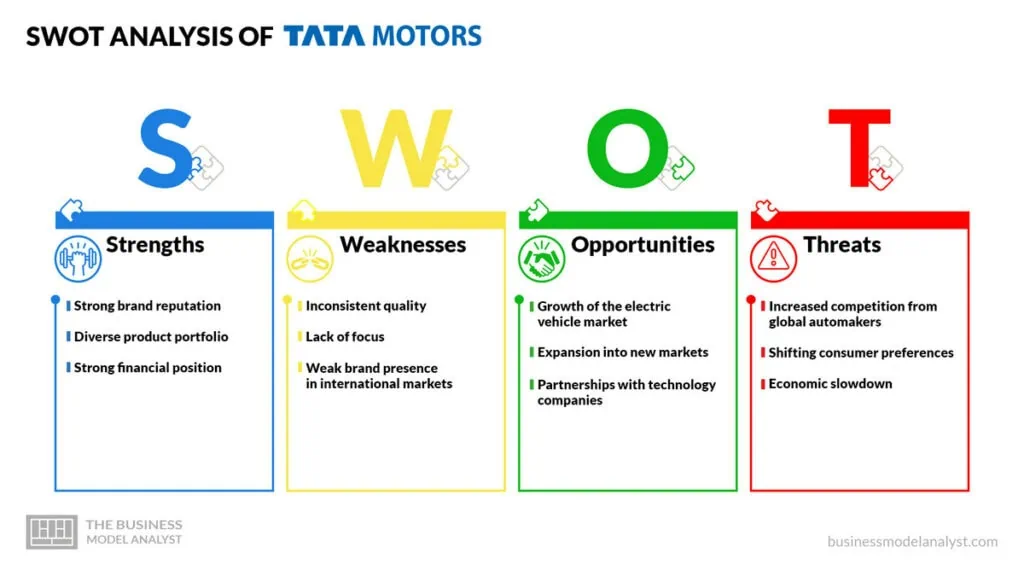
Tata Motors Strengths
Below, there are Tata Motors’ strengths:
- Strong brand reputation: Tata Motors is a well-respected brand with a long history of quality, reliability, business ethics, and corporate social responsibility. This brand reputation gives the company a competitive advantage and helps attract customers;
- Diverse product portfolio: The company also offers a diverse product portfolio that caters to a wide range of customer needs, including passenger cars, commercial vehicles, buses, and trucks. The company’s product portfolio constantly evolves to meet the market’s changing needs;
- Strong financial position: Tata Motors is a financially strong company with a good track record of profitability. This financial strength allows the company to invest in new products and technologies and expand its operations.
Tata Motors Weaknesses
Below, there are Tata Motors’ weaknesses:
- Inconsistent quality: Tata Motors has been criticized for inconsistent quality in its products. This has been a significant issue for the company, leading to customer dissatisfaction and recalls;
- Lack of focus: The company has a wide range of products, but it does not have a clear focus in any particular segment. This has made it difficult for the company to compete with other automakers that are more focused;
- Weak brand presence in international markets: Tata Motors is a major player in the Indian automotive market, but it has a weak brand presence in international markets. This has limited the company’s growth opportunities outside of India.
Tata Motors Opportunities
Below, there are Tata Motors’ opportunities:
- Growth of the electric vehicle market: The electric vehicle market is growing rapidly, and Tata Motors is well-positioned to capitalize on this growth. The company has already launched several electric vehicles, and it plans to invest heavily in this segment in the coming years;
- Expansion into new markets: Tata Motors is already present in a number of markets, but it has the potential to expand into even more markets. The company has a strong brand reputation and a diverse product portfolio, which would make it a strong competitor in new markets;
- Partnerships with technology companies: Tata Motors can leverage partnerships to develop new products and services. For example, the company has partnered with Microsoft to develop connected car solutions.
Tata Motors Threats
Below, there are the threats Tata Motors faces:
- Increased competition from global automakers: The company faces increasing competition from global automakers, such as Toyota, Honda, and Volkswagen. These automakers have more resources and a wider global reach than Tata Motors, which could make it difficult for Tata Motors to compete;
- Shifting consumer preferences: Consumers are increasingly prioritizing electric vehicles and other sustainable modes of transportation. Tata Motors is less well-positioned in the electric vehicle market than some of its competitors, which could hurt its sales in the future;
- Economic slowdown: A global economic downturn could hurt Tata Motors’ sales. People are less likely to buy cars when the economy is doing poorly.
-> Read More About Tata Motors’s SWOT Analysis.
Conclusion
Tata Motors is a leading automobile manufacturer in India and around the world. The company has a strong presence in the commercial vehicle market and is also a major player in the passenger vehicle market. It faces challenges like increased competition from global automakers and shifting consumer preferences.
However, the company is addressing these challenges and is well-positioned to remain a significant player in the global automotive industry. The company is investing in new technologies to improve the performance and efficiency of its vehicles. It is also expanding its production capacity to meet the growing product demand.
Tata Motors is also diversifying its business by entering new markets. Tata Motors is a well-positioned company with a bright future. The company has a strong track record of innovation and is committed to providing high-quality products and services to its customers.

